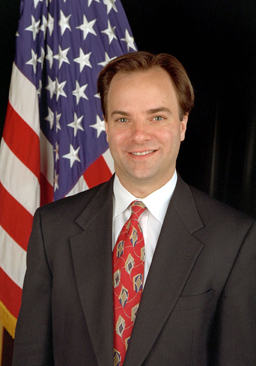Related Research Articles

Mark Barr McClellan is the director of the Robert J Margolis Center for Health Policy and the Margolis Professor of Business, Medicine and Health Policy at Duke University. Formerly, he was a senior fellow and director of the Health Care Innovation and Value Initiative at the Engelberg Center for Health Care Reform at The Brookings Institution, in Washington, D.C. McClellan served as commissioner of the United States Food and Drug Administration under President George W. Bush from 2002 through 2004, and subsequently as administrator of the Centers for Medicare and Medicaid Services from 2004 through 2006.

Medicare Part D, also called the Medicare prescription drug benefit, is an optional United States federal-government program to help Medicare beneficiaries pay for self-administered prescription drugs. Part D was enacted as part of the Medicare Modernization Act of 2003 and went into effect on January 1, 2006. Under the program, drug benefits are provided by private insurance plans that receive premiums from both enrollees and the government. Part D plans typically pay most of the cost for prescriptions filled by their enrollees. However, plans are later reimbursed for much of this cost through rebates paid by manufacturers and pharmacies.
Fee-for-service (FFS) is a payment model where services are unbundled and paid for separately.
The United States government provides funding to hospitals that treat indigent patients through the Disproportionate Share Hospital (DSH) programs, under which facilities are able to receive at least partial compensation.
John E. "Jack" Wennberg is the pioneer and leading researcher of unwarranted variation in the healthcare industry. In four decades of work, Wennberg has documented the geographic variation in the healthcare that patients receive in the United States. In 1988, he founded the Center for the Evaluative Clinical Sciences at Dartmouth Medical School to address that unwarranted variation in healthcare.
Healthcare reform in the United States has a long history. Reforms have often been proposed but have rarely been accomplished. In 2010, landmark reform was passed through two federal statutes: the Patient Protection and Affordable Care Act (PPACA), signed March 23, 2010, and the Health Care and Education Reconciliation Act of 2010, which amended the PPACA and became law on March 30, 2010.
Cost-shifting is either an economic situation where one individual, group, or government underpays for a service, resulting in another individual, group, or government overpaying for a service. It can occur when one group pays a smaller share of costs than before, resulting in another group paying a larger share of costs than before. Some commentators on health policy in the United States believe the former currently happens in Medicare and Medicaid as they underpay for services resulting in private insurers overpaying. Although the term cost shift is used in the field of healthcare these days and there are many studies about it, other fields have more or less used it. For example, its origins go back to the environmental economy where, Cost-shifting referred to the practice where corporations pass the harmful consequences and negative externalities of economic production to third parties and communities whether those that are part of the production circuit or are in some way beneficiaries or those that are outside this circle, K.W. Kapp, is one who coined the concept. This concept is also used in the American legal system, especially since the cost of electronic discovery has increased dramatically due to a large amount of raw information and the urgent need to extract relevant data, its processing, and analysis. In the past, each of the plaintiffs and defendants had to bear the cost, but later many of those who prepared the summons demanded the transfer of the cost because they thought they would have to pay for something they did not do. In this regard, some courts have agreed to shift part of the costs to the complainant.
There were a number of different health care reforms proposed during the Obama administration. Key reforms address cost and coverage and include obesity, prevention and treatment of chronic conditions, defensive medicine or tort reform, incentives that reward more care instead of better care, redundant payment systems, tax policy, rationing, a shortage of doctors and nurses, intervention vs. hospice, fraud, and use of imaging technology, among others.
Bundled payment is the reimbursement of health care providers "on the basis of expected costs for clinically-defined episodes of care." It has been described as "a middle ground" between fee-for-service reimbursement and capitation, given that risk is shared between payer and provider. Bundled payments have been proposed in the health care reform debate in the United States as a strategy for reducing health care costs, especially during the Obama administration (2009–2016). Commercial payers have shown interest in bundled payments in order to reduce costs. In 2012, it was estimated that approximately one-third of the United States healthcare reimbursement used bundled methodology.
The Independent Payment Advisory Board (IPAB) was to be a fifteen-member United States government agency created in 2010 by sections 3403 and 10320 of the Patient Protection and Affordable Care Act which was to have the explicit task of achieving specified savings in Medicare without affecting coverage or quality. Under previous and current law, changes to Medicare payment rates and program rules are recommended by MedPAC but require an act of Congress to take effect. The system creating IPAB granted IPAB the authority to make changes to the Medicare program with the Congress being given the power to overrule the agency's decisions through supermajority vote. The Bipartisan Budget Act of 2018 repealed IPAB before it could take effect.
Inovalon is an American technology company that provides cloud-based tools for healthcare.
An accountable care organization (ACO) is a healthcare organization that ties provider reimbursements to quality metrics and reductions in the cost of care. ACOs in the United States are formed from a group of coordinated health-care practitioners. They use alternative payment models, normally, capitation. The organization is accountable to patients and third-party payers for the quality, appropriateness and efficiency of the health care provided. According to the Centers for Medicare and Medicaid Services, an ACO is "an organization of health care practitioners that agrees to be accountable for the quality, cost, and overall care of Medicare beneficiaries who are enrolled in the traditional fee-for-service program who are assigned to it".
Sachin H. Jain is an American physician who held leadership positions in the Center for Medicare and Medicaid Services (CMS) and the Office of the National Coordinator for Health Information Technology (ONC). From 2015 to 2020, he served as president and chief executive officer of the CareMore Health System. In June 2020, it was announced that he would join the SCAN Group and Health Plan as its new President and CEO. He is also adjunct professor of medicine at the Stanford University School of Medicine and a Contributor at Forbes. In 2018, he was named one of American healthcare's most 100 most influential leaders by Modern Healthcare magazine (#36).
Balance billing, sometimes called surprise billing, is a medical bill from a healthcare provider billing a patient for the difference between the total cost of services being charged and the amount the insurance pays. It is a pervasive problem in the United States with providers who are out of network, and therefore not subject to the rates or terms of providers who are in-network. Balance billing has a variable prevalence by market and specialty.
Paul Murdock Ellwood Jr. was an American physician and a controversial figure in American health care. Often referred to as the "father of the health maintenance organization", he not only coined the term, he also played a role in bringing about structural changes to the American health care system to simultaneously control cost and promote health by replacing fee-for-service with prepaid, comprehensive care. The term "HMO" was coined by Ellwood in a January 1970 Fortune magazine article. More recently, he had advanced an agenda for monitoring health outcomes, so that patients, providers, and payers can make health care decisions based on real information about what treatments and providers are actually effective.

Peter B. Bach is a physician and writer at Memorial Sloan-Kettering Cancer Center where he is Director of the Center for Health Policy and Outcomes. His research focuses on healthcare policy, particularly as it relates to Medicare, racial disparities in cancer care quality, and lung cancer. Along with his scientific writings he is a frequent contributor to The New York Times and other newspapers.
Health policy and management is the field relating to leadership, management, and administration of public health systems, health care systems, hospitals, and hospital networks. Health care administrators are considered health care professionals.
Value-Based Insurance Design is a demand-side approach to health policy reform. V-BID generally refers to health insurers’ efforts to structure enrollee cost-sharing and other health plan design elements to encourage enrollees to consume high-value clinical services – those that have the greatest potential to positively impact enrollee health. V-BID also discourages the use of low-value clinical services – when benefits do not justify the cost. V-BID aims to increase health care quality and decrease costs by using financial incentives to promote cost efficient health care services and consumer choices. V-BID health insurance plans are designed with the tenets of "clinical nuance" in mind. These tenets recognize that medical services differ in the amount of health produced, and the clinical benefit derived from a specific service depends on the consumer using it, as well as when and where the service is provided.
Steven Pearson is an American physician, bioethicist, and the Founder and President of the non-profit health policy and comparative effectiveness research organization Institute for Clinical and Economic Review in Boston, MA. He conducts research on cost-effectiveness analysis and healthcare technology assessment. He is also a lecturer in Harvard's Department of Population Medicine and a member of the National Institutes of Health (NIH) Comparative Effectiveness Research Steering Committee.
Elliott S. Fisher is a health policy researcher and advocate for improving health system performance in the United States. He helped develop the concept of accountable care organizations and championed their adoption by Medicare. The development of the Affordable Care Act was influenced by his research on disparities in healthcare spending and utilization across the United States. He has strongly supported a rapid transition from fee-for-service to pay-for-performance models in the U.S. healthcare industry. He is a tenured faculty member at Dartmouth College, where he teaches in the Masters in Public Health program.
References
- ↑ "Team". avalere.com. Retrieved 2018-05-21.
- ↑ "Choice of Health Plans to Vary Sharply From State to State". The New York Times. September 23, 2009.
- ↑ "Sticker Shock: Some Medicare Part D Beneficiaries Will Pay More Next Year". The Wall Street Journal. November 19, 2014.
- ↑ "Obamacare Facing More Scrutiny From Ascendant Republicans". Bloomberg. November 5, 2014.
- ↑ "Sticker Shock: Some Medicare Part D Beneficiaries Will Pay More Next Year". The Wall Street Journal. November 19, 2014.
- ↑ Mendelson, DN. (December 1991), The Problem of Rising Health Care Costs., Critical Issues in American Health Care Delivery and Finance Policy.
- ↑ Mendelson, DN; Carino, TV (February 2005), "Evidence-Based Medicine in the United States: De Rigueur or Dream Deferred?", Health Affairs, Health Affairs., 24 (1): 133–136, doi: 10.1377/hlthaff.24.1.133 , PMID 15647224
- ↑ Mendelson, Salinsky, EM (June 1997), "Health Information Systems and the Role of State Government.", Health Affairs, Health Affairs., 16 (3): 106–19, doi: 10.1377/hlthaff.16.3.106 , PMID 9141327
{{citation}}: CS1 maint: multiple names: authors list (link) - ↑ "Duke Margolis Center Health Policy Launches". Duke. February 9, 2017.
- ↑ Schwartz, WB; Mendelson, DN (April 11, 1991), "Hospital Cost Containment in the 1980s: Hard Lessons Learned and Prospects for the 1990s.", New England Journal of Medicine, 324 (15): 1037–1042, doi: 10.1056/NEJM199104113241506 , PMID 2005941
- ↑ "Inovalon to acquire Avalere for $140M". Modern Healthcare. August 24, 2015.